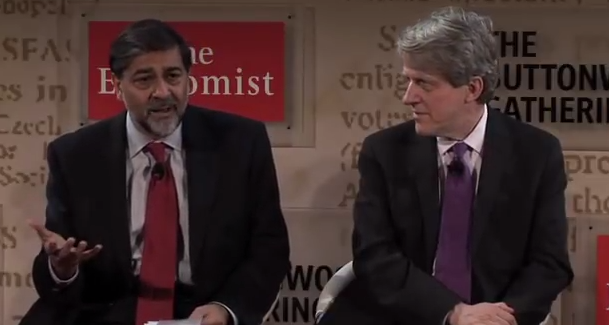Washington Post: Google — not Goldman Sachs — deserves our best minds
Collateralized debt obligations, credit default swaps, and structured investment vehicles are some of the greatest innovations created by the financial industry in recent times. What did this get us? Subprime loans, the housing bubble, and the financial meltdown. And with high-frequency trading and other technology gimmicks that investment banks are increasingly using to skim money off the top of stock trading systems, it is no wonder that investment banker are sometimes called the modern day robber barons.
But the industry isn’t all bad. There are also financial innovations such as mortgages—that allow people to afford houses; insurance mechanisms such as currency and interest-rate swaps — that allow global corporations to hedge against swings in currency values; and high-yield bonds—that allow companies to raise money and grow. Indeed “every human activity that matters has to be financed” argued Nobel Laureate Robert Shiller in a debate with me at The Economist’s Buttonwood Gathering on Wednesday in New York City. He was arguing about the importance and value of the finance industry.
When Greg Ferenstein of TechCrunch (who was a co-moderator) asked me if I would defend the technology industry in the debate titled “Goldman versus Google: A career on Wall Street or in Silicon Valley?” I readily agreed. Yes, I was terrified about debating a Nobel Prize winner. But I couldn’t fathom how anyone could convincingly argue that our nation’s finest engineers and scientists should forsake the tech industry for Goldman Sachs.
In my talk, I highlighted some of the innovations that the tech industry — and Google — have brought us in recent times, starting with the Internet itself. We now have a free ocean of knowledge available to search. We can watch videos of lectures by today’s leading thinkers; connect via e-mail and social media with anyone, anywhere; we can work anywhere and crowdsource solutions to problems.
With the apps on our smartphones, we can transact commerce, perform medical tests, and find directions to where we want to go. Soon self-driving cars such as Google’s will revolutionize transportation by allowing us to be productive while we commute; they will eliminate traffic jams and accidents; we won’t need parking spots because these cars can drop us where we want to go and come back when we’re ready; and we won’t need traffic signals or speed limits. Technologies such as Google Loon will provide ultra-fast Internet connectivity everywhere we go. Advances in 3D printing will revolutionize manufacturing. Sensor-based apps will help us monitor and improve our health. Water sanitation technologies will provide the world with abundant clean water.
All of these advances are being created by entrepreneurs. These entrepreneurs are less dependent on venture capital and finance than ever before — because the costs of computing and sensors have dropped exponentially. Kids working in basements on shoestring budgets can now solve humanity’s grand challenges, its big problems. And this is what we want our children doing instead of engineering the financial system and creating more financial bubbles as companies such as Goldman Sachs do. We want world-changing technology innovation, not world-changing financial skimming.
Shiller rightfully argued that without the financial services industry we would not have an economy. “We need more engineers than we need finance people. But we need finance people to provide the resources for them to do these things” he said. Shiller argued that it’s not a choice between Google and Goldman, we need both. He defended financial engineering by saying that this is what led to the creation of the mortgage and other tenants of our economy. He said “when you study finance, you are studying how to make things happen, on a big scale, on a lasting scale … that has to matter more than getting into Google and programming some little gimmick.”
Shiller clearly doesn’t understand what Google and the technology industry does. During our meeting before the debate, I got to know him. I developed a deep respect and admiration for his intellect and values. Yet I had to give him a crash course in social media and show him how to use Twitter.
Shiller is right about the importance of finance and I concede to him what he said—that “young graduates with a moral purpose and interest in the financial world should join Goldman.”
What is often missing from the finance industry is the moral purpose. It is the dearth of this that led to the asset bubbles that Shiller has researched and written about. It is only the addition of a moral purpose that will fix the finance industry’s image problem and allow it to regain its stature as a force for good rather than greed and evil.

